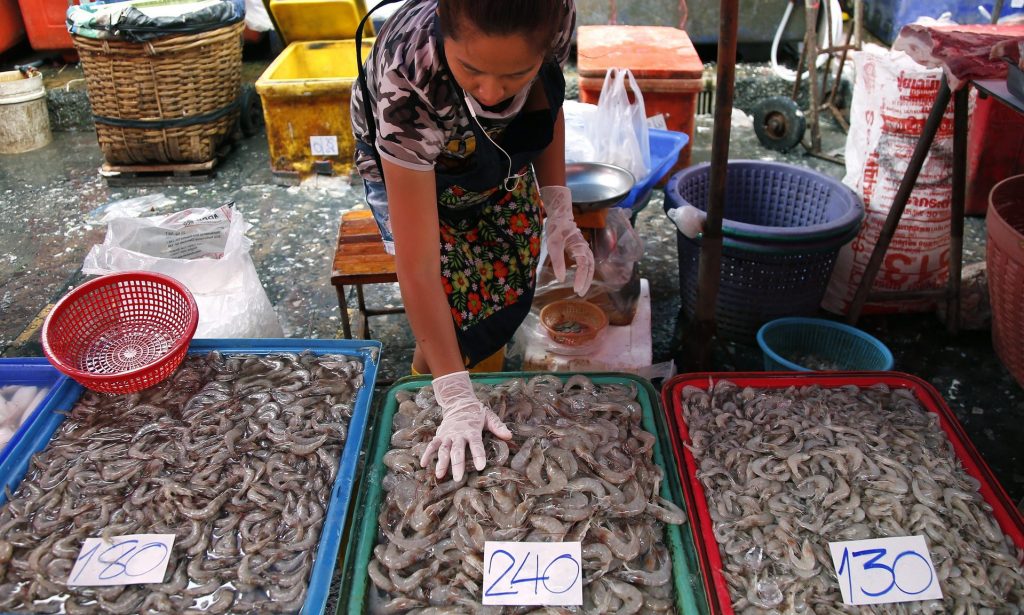
Photograph: Barbara Walton/EPA
Cambodian villagers have filed a lawsuit against four companies that supply American supermarkets, claiming they were trafficked to work under slavery-like conditions in a Thai seafood factory that exports to the US.
The civil lawsuit, filed in June in a California federal court, accuses the US and Thai firms of knowingly profiting from the villagers’ working conditions and violating the Trafficking Victims Protection Act, a US law aimed at preventing human trafficking. Last week, the firms filed a motion to dismiss the complaint on jurisdictional grounds.
The seven villagers claim they were recruited to work in Thai seafood factories that produce shrimp and seafood for export to the US. Promised good wages, many of the villagers – none of whom had previously left Cambodia – took out loans to finance the huge travel and recruitment fees. In some cases they even remortgaged their farms to obtain the jobs, the complaint states.
On arriving at the Thai factories, however, the five men and two women were forced to work six or seven days a week in horrendous conditions, the lawsuit alleges. Wages were far less than promised, accommodation consisted of a single concrete floor, and one toilet served 200 people, according to the complaint.
The lawsuit also alleges that passports and travel documents were withheld and large “fees” docked against the workers’ pay, rendering some claimants so poor that they had to scavenge for fish washed up on the beach.
The complainants claim they were victims of human trafficking, forced labour, indentured servitude and peonage while working in Thailand in 2010 and 2011.
“What happened to me was wrong,” said claimant Keo Ratha in a statement. “I filed this suit so companies would think twice before exploiting trafficked workers in the future.”
The complaint names Phatthana Seafood and SS Frozen Food, two Thai companies and major exporters to the US, as well as two California-based importers, Rubicon Resources LLC and Wales & Co Universe, which sell shrimp and seafood to US companies. Walmart is named in the complaint among the buyers (pdf) of Phatthana’s shrimp products.
The four companies are part of a “vertically integrated enterprise to produce, transport and sell seafood products from Thailand in the US”, the lawsuit claims.
According to the complaint, Phattana Seafood shares facilities, resources and management with SS Frozen Food, with both companies marketing and selling their products through Rubicon Resources. Wales & Co Universe, the complaint continues, is part of the larger Wales Group, which owns and controls Rubicon along with Phattana, SS Frozen Food and other Thai seafood companies.
Phatthana Seafood has previously been the subject of controversy, after a 2012 Human Rights Watch article detailed claims of debt bondage and human trafficking by workers in its Thai factory. The company responded saying it followed relevant international standards and Thai laws.
In 2014, Rubicon’s CEO, Brian Wynn, told a Thai seafood seminar that media criticism of the industry was doing an “injustice to those [companies] that treat their workers fairly”. He added: “The workers represent the very heart and soul of our company, whether they are fishermen or workers in a processing plant.”
Last Wednesday, the defendants filed a motion to dismiss the complaint on the grounds that “the conduct complained of occurred outside the US and the complaint does not allege a basis for extraterritorial jurisdiction”.
Rubicon Resources did not respond to multiple requests for comment. Wales & Co Universe could not be reached. Walmart did not respond to multiple requests for comment.
Lawyers representing the Cambodian villagers argue that the defendants’ basis for dismissal is incorrect.
“Congress updated the trafficking law in 2008 to ensure it covered the entire supply chain, including those at the top, by placing liability on ‘anyone who benefits’ from trafficking,” said lead attorney Agnieszka Fryszman.
“The 2008 amendment also specifically provides for extraterritorial jurisdiction, consistent with the Palermo protocol on human trafficking, because traffickers often operate across international borders. The 2008 amendment intentionally covers just this type of conduct.”
The villagers returned to Cambodia in debt, the lawsuit claims, and, five years later, are still suffering. One villager, Phan Sophea, claims he lost his farmland as a result of the debts he incurred after working in the Thai factory, and says he and his children now often go without food. Sem Kosal, another villager, said he is now too poor to pay his son’s school fees or buy medicine for his children when they are ill.
“The villagers have the goal of being compensated for the injustices they have suffered, but the wider goal is making companies more aware, and more careful, about how they do business,” said Fryszman.
In 2014, Thailand was downgraded to the lowest level in the US State Department’s Trafficking in Persons (Tip) report due to continued human trafficking and forced labour in various sectors, including the seafood industry. Although the Thai government has implemented reforms and made high-profile arrests, and Thailand consequently received an upgrade in this year’s Tip report, activists claim abuses in the £5bn industry remain rampant.
Phil Robertson of Human Rights Watch welcomed the legal action over the workers’ allegations, claiming that retailers too often prefer to overlook human rights abuses in their supply chain when they should be launching investigations and demanding an end to the abuse.
“The only way this ‘catch me if you can’ behaviour is going to stop is if lawsuits like this one are successful, consumers get angry, and the US government finally gets tough in blocking the import of products made with forced labour,” Robertson said.

